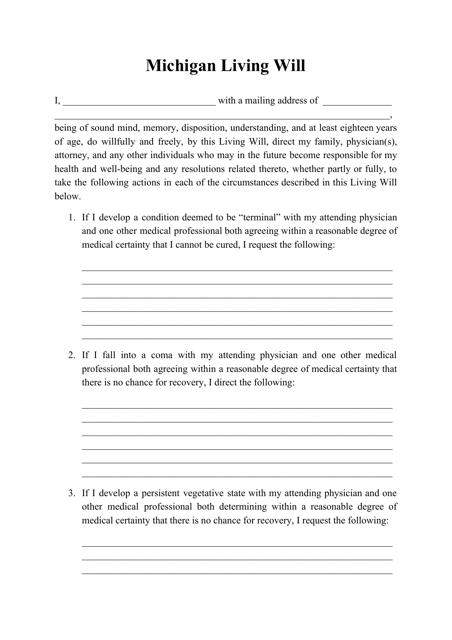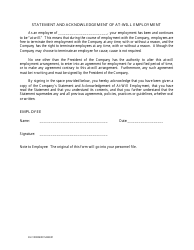Living Will Form - Michigan
A Michigan Living Will - sometimes confused with an Advance Directive - is crucial for people who wish to protect themselves in case they can no longer communicate their wishes relating to their health and therefore can not actively take part in making any decisions for their own lives. Any competent adult is eligible to execute a will at any time in order to direct the providing, withholding, or withdrawal of life-sustaining treatments. Make your own form with our online form builder .
A basic Living Will template ( found below ) can be used to outline the steps people want to take in the worst-case scenarios - including pain management, instructions on personal grooming and bathing, and any steps regarding the desired religious, spiritual and emotional support. It allows an individual to legally refuse treatment, even if this might lead to death. A person can also indicate their wish to donate their organs and tissues after death.
Michigan does not have any specific laws for these types of wills. Individuals wishing to create one are strongly recommended to title the document "Living Will" before signing and dating the form.
What Is a Michigan Living Will?
A Living Will is a legal document that specifies the type of medical care that an individual does or does not want in the event if they are unable to communicate their wishes. Living Wills come into play only when one faces a life-threatening condition and is unable to assert their specific desires regarding treatment.
In the case when an individual suffering from a terminal illness or with a life-threatening injury falls unconscious, hospitals and doctors must refer to their will to determine whether or not the patient wanted life-sustaining treatment, such as tube feeding or assisted breathing.
An individual can print a will to pre-organize their health care in the future situation, to prevent major arguments between family members, to control any necessary medical treatments and procedures and to reduce potential extra medical bills.
How to Make a Living Will in Michigan?
A Michigan Living Will template commonly includes the kinds of medical procedures administered to patients who are seriously ill. These include the following:
- The transfusion of blood and blood products;
- Cardiopulmonary resuscitation;
- Diagnostic tests;
- Dialysis;
- The administration of drugs - specifically pain medication, food, and water;
- Tissue and organ donation;
- The use of a respirator;
- Surgery.
A patient has to print out their will in several copies. It is recommended to keep the original with the other important paperwork where a family member or agent may expect to find them. The copies of the Living Will must be handed out to the medical professionals and relatives tasked with either administering the treatment or executing the will.


















